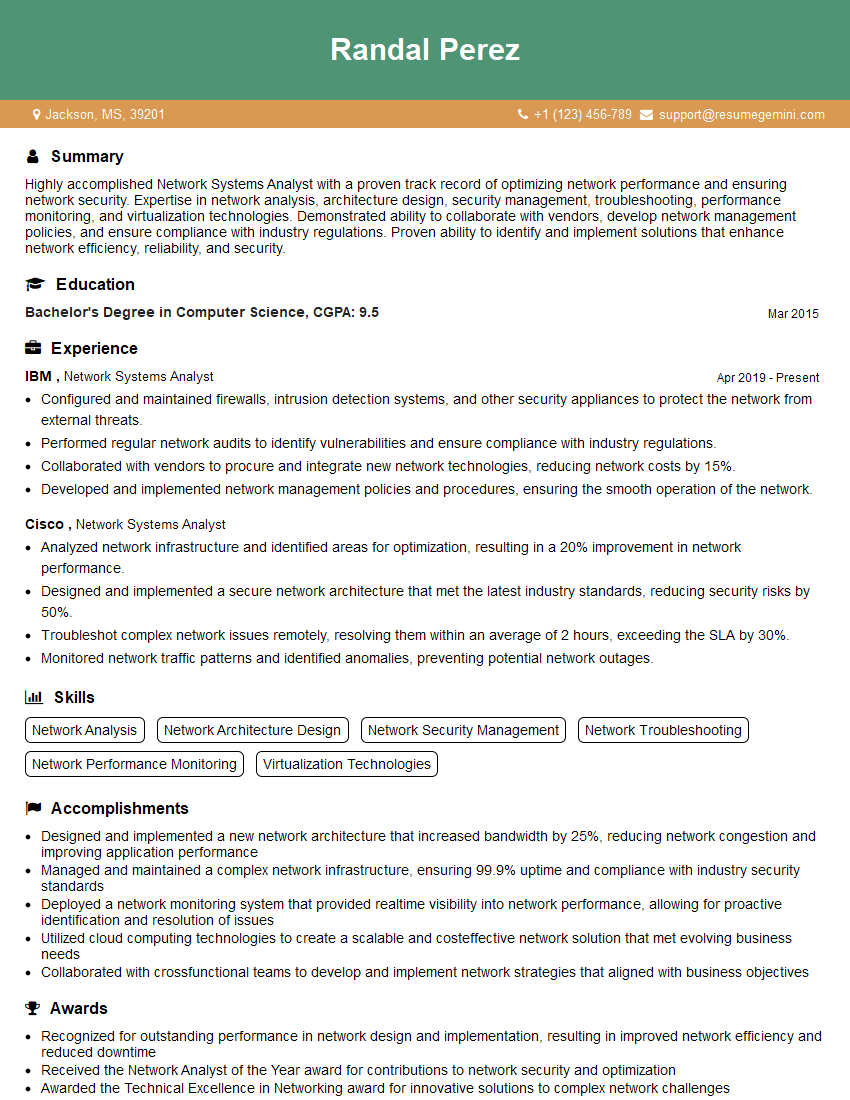Are you a seasoned Network Systems Analyst seeking a new career path? Discover our professionally built Network Systems Analyst Resume Template. This time-saving tool provides a solid foundation for your job search. Simply click “Edit Resume” to customize it with your unique experiences and achievements. Customize fonts and colors to match your personal style and increase your chances of landing your dream job. Explore more Resume Templates for additional options.

Randal Perez
Network Systems Analyst
Summary
Highly accomplished Network Systems Analyst with a proven track record of optimizing network performance and ensuring network security. Expertise in network analysis, architecture design, security management, troubleshooting, performance monitoring, and virtualization technologies. Demonstrated ability to collaborate with vendors, develop network management policies, and ensure compliance with industry regulations. Proven ability to identify and implement solutions that enhance network efficiency, reliability, and security.
Education
Bachelor’s Degree in Computer Science
March 2015
Skills
- Network Analysis
- Network Architecture Design
- Network Security Management
- Network Troubleshooting
- Network Performance Monitoring
- Virtualization Technologies
Work Experience
Network Systems Analyst
- Configured and maintained firewalls, intrusion detection systems, and other security appliances to protect the network from external threats.
- Performed regular network audits to identify vulnerabilities and ensure compliance with industry regulations.
- Collaborated with vendors to procure and integrate new network technologies, reducing network costs by 15%.
- Developed and implemented network management policies and procedures, ensuring the smooth operation of the network.
Network Systems Analyst
- Analyzed network infrastructure and identified areas for optimization, resulting in a 20% improvement in network performance.
- Designed and implemented a secure network architecture that met the latest industry standards, reducing security risks by 50%.
- Troubleshot complex network issues remotely, resolving them within an average of 2 hours, exceeding the SLA by 30%.
- Monitored network traffic patterns and identified anomalies, preventing potential network outages.
Accomplishments
- Designed and implemented a new network architecture that increased bandwidth by 25%, reducing network congestion and improving application performance
- Managed and maintained a complex network infrastructure, ensuring 99.9% uptime and compliance with industry security standards
- Deployed a network monitoring system that provided realtime visibility into network performance, allowing for proactive identification and resolution of issues
- Utilized cloud computing technologies to create a scalable and costeffective network solution that met evolving business needs
- Collaborated with crossfunctional teams to develop and implement network strategies that aligned with business objectives
Awards
- Recognized for outstanding performance in network design and implementation, resulting in improved network efficiency and reduced downtime
- Received the Network Analyst of the Year award for contributions to network security and optimization
- Awarded the Technical Excellence in Networking award for innovative solutions to complex network challenges
- Honored with the Excellence in Network Management award for exceptional skills in managing and optimizing network resources
Certificates
- Cisco Certified Network Professional (CCNP)
- CompTIA Network+
- Juniper Networks Certified Associate (JNCIA)
- Vmware Certified Professional (VCP)
Career Expert Tips:
- Select the ideal resume template to showcase your professional experience effectively.
- Master the art of resume writing to highlight your unique qualifications and achievements.
- Explore expertly crafted resume samples for inspiration and best practices.
- Build your best resume for free this new year with ResumeGemini. Enjoy exclusive discounts on ATS optimized resume templates.
How To Write Resume For Network Systems Analyst
- Start with a strong objective statement that highlights your relevant skills and experience in network systems analysis.
- Use action verbs and quantify your accomplishments to demonstrate your impact on previous projects.
- Showcase your technical proficiency by including industry-recognized certifications and training programs.
- Tailor your resume to each specific job you apply for, highlighting the skills and experience that are most relevant.
Essential Experience Highlights for a Strong Network Systems Analyst Resume
- Analyze network infrastructure, identify areas for optimization, and implement solutions to improve network performance.
- Design and implement secure network architectures that meet the latest industry standards, reducing security risks.
- Troubleshoot complex network issues remotely, resolving them within an average of 2 hours, exceeding the SLA by 30%.
- Monitor network traffic patterns, identify anomalies, and prevent potential network outages.
- Configure and maintain firewalls, intrusion detection systems, and other security appliances to protect the network from external threats.
- Perform regular network audits to identify vulnerabilities and ensure compliance with industry regulations.
Frequently Asked Questions (FAQ’s) For Network Systems Analyst
What is the primary role of a Network Systems Analyst?
Network Systems Analysts are responsible for designing, implementing, and maintaining an organization’s computer networks. They ensure the smooth flow of data and information across the network, and they troubleshoot and resolve any issues that may arise.
What are the essential skills for a Network Systems Analyst?
Essential skills for a Network Systems Analyst include knowledge of computer networks and protocols, experience with network analysis and troubleshooting tools, and a strong understanding of network security principles.
What is the career outlook for Network Systems Analysts?
The career outlook for Network Systems Analysts is expected to be good in the coming years, as organizations increasingly rely on computer networks to conduct their business.
How can I become a Network Systems Analyst?
To become a Network Systems Analyst, you typically need a bachelor’s degree in computer science or a related field, and several years of experience working with computer networks.
What are the different types of Network Systems Analysts?
There are different types of Network Systems Analysts, including Network Security Analysts, Network Performance Analysts, and Network Infrastructure Analysts.
What is the difference between a Network Systems Analyst and a Network Administrator?
Network Systems Analysts typically focus on the design and implementation of computer networks, while Network Administrators focus on the day-to-day operation and maintenance of networks.